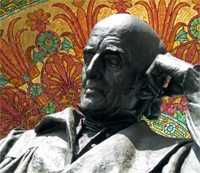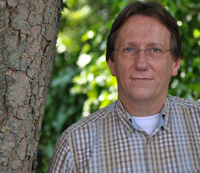|
Booking

|
If you
are interested in seminars, courses or tutoring
based on the philosophical points of view made
below, please email
booking@classicalhomeopathy.eu.
Ewald Stöteler will be leading these seminars,
courses or tutoring with thoroughness and
expediency, based on his 25 years of practicing
homeopathy according to the basic assumptions
cited below.
The homeopathic treatment, using as its
assumption the disease classification by Samuel
Hahnemann, consists of several distinct elements.
The philosophical foundation contains
differences on important elements or offers in
depth nuances compared to the usual homeopathic
point of view. The actual effects for an
analysis and the usage of the medicine, does
then also emerge in a different light.
Philosophy, analysis, materia medica and
casuistic deserve a closer look and evaluation.
The methodology with the disease classification
as its starting point, is based on such a
foundation.
According to this vision, philosophy should form
the basis of medicine. The philosophy shapes the
groundwork from which action and treatment are
established.
|
Philosophy |
Workplace |
Casuistic |
|
A complete
description of
this philosophy
can be found in
Samuel
Hahnemann’s book
“Organon of the
Medical Art”.
|
The functional
consequences for
homeopathic
treatment of
this philosophy,
are found in
Hahnemann’s work
“Chronic
Diseases”.
|
Casuistic is
dealt with
according to the
“Organon of the
Medical Art” and
“Chronic
Diseases”. Any
complications
are traced back
to the
applicable
paragraph in the
“Organon of the
Medical Art” and
the relevant
text-fragment
from “Chronic
Diseases”. These
paragraphs and
text-fragments
are never taken
out of their
context.
|
Contextual Materia Medica
Contextual Materia Medica is
the science of the medicine providing insight
into the dynamic illness processes of the human
being. The hereditary burden with which someone
is borne, determines to a degree the
constitution. In turn, the constitution
determines how someone can and will respond in
certain life-circumstances. In this way, the
hereditary burden, constitution and biography
are closely linked and at the same time very
different entities. To each distinct entity
belongs a different medicinal-group. The
heritage somewhat forms the “context” from which
the constitution of the human being is born.
The complete human being
lives his biography. In this way, a mutual
contextual relationship is developed between de
various life-areas in which one to a degree
arises from the other and they exercise a strong
influence upon each other. The corresponding
materia medica, in which one pathological state
develops to a certain extend from another, is
called the contextual materia medica. The
strength of Samuel Hahnemann lies in the fact
that he created a scientific foundation for
homeopathy. Working according to the
aforementioned philosophy, involves a very
different approach. This requires a thorough
study.
Read more about the course
Contextual Materia Medica »
Course A (5 days) & Course
B (5 days)
For groups with a minimum of 20 persons
Philosophy can be considered the basis of
medical science. Philosophy is the leading
vision for our actions and the way we treat
patients and it is the foundation for
homeopathic science. These principles, that are
based on laws of nature, are described in a
magnificent way in Samuel Hahnemann’s ‘Organon’
and ‘Chronic Diseases’. The central subjects in
Course A & B are:
-
The
pathology of Samuel Hahnemann,
also referred to as ‘The Disease
Classification’ (incidents,
epidemic diseases, acute
miasmatic diseases, hereditary
taint, etc..)
-
The use of
highly potentiated medicine, the
LM potencies
-
The use of
a smelling dose
-
The
prescription of medication for
different kinds of diseases by
alternating prescription
-
Degenerative organ diseases and
their treatment, based on the ‘Organon’
and ‘Chronic diseases’
-
The
practical consequences of this
philosophy for the treatment of
patients in daily practice can
be found in Hahnemann’s work
‘The Chronic Diseases’
-
The
consistent application of the
similia rule in all aspects of
the treatment (in the
communication and prescription
of a similar clinical picture,
similar in potency, dosage and
frequency, similar disease
dynamics)
Read more about Course A
and Course B »
|
About
Ewald Stöteler |

|
Ewald Stöteler
came into
contact with
classic
homeopathy at a
very young age
and was
immediately
“taken” by it.
As mentioned
before, he has
been practicing
homeopathy
intensively for
the last 25
years. That the
above-mentioned
renewed elements
of homeopathy
concerning the
treatment of
patients have
been placed on
the forefront is
of credit to him.
All information
regarding this,
can be found on
our website.
Ewald Stöteler
started
relatively early
to pass on
knowledge
through
teaching. With
almost 20 years
of experience as
a teacher, he
can rely on a
huge amount of
experience. For
over five years,
he has been the
managing
director of the
Homeopathie
Academie
Nederland. This
is his own
developed
schooling, based
on the
above-mentioned
philosophy. His
ability to
explain the
issues clearly,
insures that the
students
experience his
classes as very
inspiring and
offering clarity.
His ideal, to
bring homeopathy
to the world, is
being realised
in this way.
Partly due to
this ideal, he
has held
seminars in
several
countries and
his articles
have been
published in and
outside of the
Netherlands.
Several books
written by him,
will soon be
available in
both English and
German.
|
|
